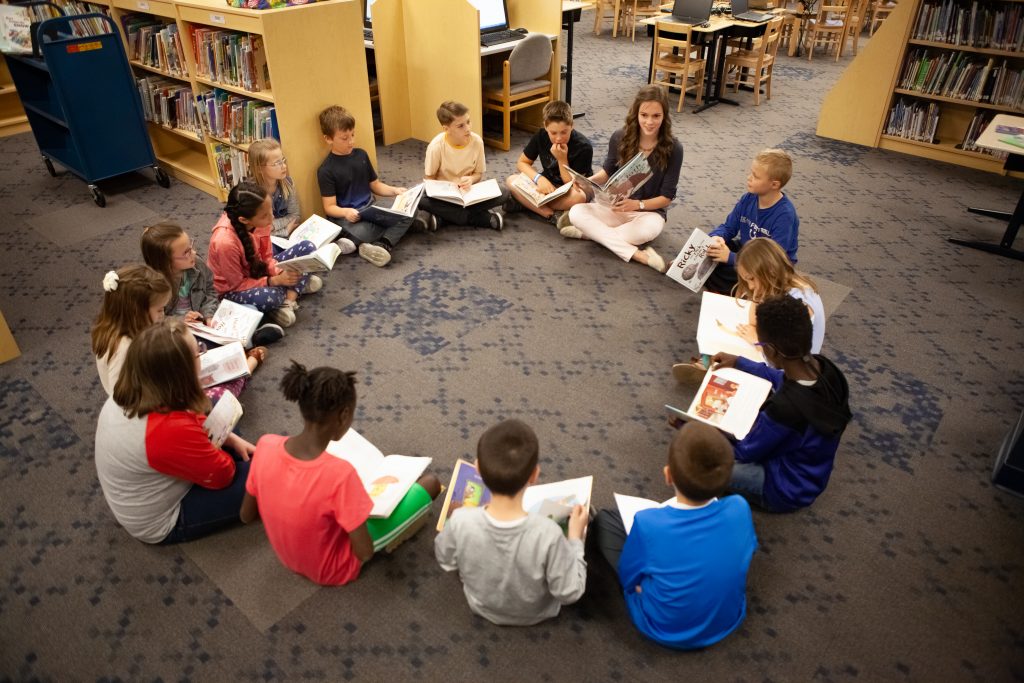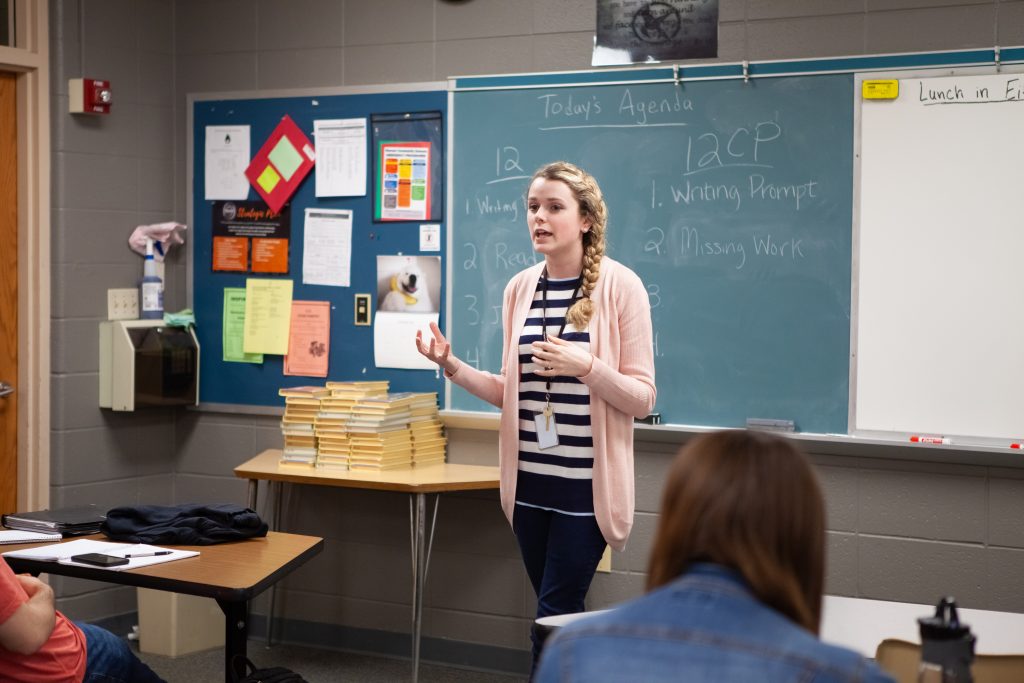
What is Happening with the National Teacher Shortage? Q + A with Dr. Cheryl Bremer

If you’ve watched the news, been on Facebook, or talked to a teacher friend, there is a good chance that you are aware of the national teacher shortage crisis. But did you know that when school began in August of 2019, there were 1,200 teaching positions still open?
We sat down with the Dean of the School of Education at Grace, Dr. Cheryl Bremer, to learn more about this crisis, what caused it, and how Grace is preparing its future teachers to seize opportunities in the face of difficulty.
Q: Tell me a little bit about the national teacher shortage. When did it start?
A: I think we’ve always had a teacher shortage. My focus has mostly been in special education — and most definitely, there has been a shortage in at least the last 15 years. When I did my dissertation for my Ph.D. back in 2008, I remember reading reports about the shortage in special ed. As more and more students are identified with disabilities, and as the autism rates continue to increase exponentially, the need for teachers to help serve those students increases. Unfortunately, the teacher shortage is kind of synonymous with special education.
In addition, we’ve seen ongoing teacher shortages in math education and science education. But general education has certainly joined the ranks of the shortage crisis. Over the past three to five years, general educators have slowly become harder to find.
To put it in perspective, I get between three to five emails a week from principals asking for eligible graduates. I will get emails in August asking about who is graduating in December and even in May. They are even asking for a chance to interview them early — that’s new! I typically do get requests, but this year, we literally have no one to give them because all of our student teachers have been placed in classrooms. Some are even stepping into full-time positions the day after they finish student teaching.

Q: What are some of the factors that contribute to the teacher shortage?
A: One unmistakable factor is COVID. The pandemic pushed those who were thinking about retiring into making that decision early, making the retirement rates extremely high the past few years. In addition, COVID caused another group of teachers to leave the profession or take a break for health reasons. While everyone was facing risk and uncertainty during the pandemic, I would argue that teachers had an extra dose of that because of the challenges that a school setting poses.
The other piece to the teacher shortage is attrition. Teachers just don’t stay at the same rate that they used to. Teacher attrition is almost as concerning as the teacher shortage because you can get a teacher in, but it’s challenging to get them to stay. The longer you are in teaching, the more masterful you become. So if you have a lot of teachers who are leaving, you miss out on that expertise that seasoned teachers have to offer. This is one of the reasons we train our students at Grace to be competent. If competent, they will have greater confidence in their role and are more likely to stay in a position once there.
And on that note, it’s important to hit on the teacher preparation piece. There is an interesting connection between teachers who enter the field with a traditional teacher preparation program and the length of time they stay in teaching. Teachers who are a product of alternative preparation programs often become teachers before ever taking a pedagogy course. It’s astonishing how many teachers are teaching on limited or emergency licenses. This means that they are in the classroom acting as a teacher but without the qualifications to do so. Studies show that these teachers have a higher rate of attrition. And the field where most of these limited and emergency licenses are in effect is special education — where the shortage crisis is the most threatening. The lack of preparation leads to attrition which results in the shortage. It’s a vicious cycle.
Q: We know that every circumstance poses threats and opportunities. What are some of the opportunities that have resulted from the teacher shortage?
A: That’s a good question! The obvious answer and the biggest opportunity is that our education students have an excellent chance at landing a job in their field right out of college (if not before graduation!).
But there are many opportunities for innovation as a result of the teacher shortage that many people don’t recognize.
One of those opportunities we’ve experienced at Grace is the Teacher Residency Program. This program resulted from a $30,000 state-funded grant that allows Warsaw Schools and Grace College to develop two new teacher residents for the 2021-22 school year. Two years ago, we began exploring the idea of providing a year-long student teaching placement in high-needs fields, in this case, special education, that enables students to move into a position easily afterward. We’ve also explored similar options with Whitley County Schools and with the Dual Language Immersion (DLI) program in Warsaw. Districts are being very innovative about how they are partnering with education programs to “grow their own.”
Additionally, we are working with Ivy Tech to help bridge the gap from Ivy Tech into the School of Education at Grace. It’s an effective way to help diversify the teaching force which lacks diversity in terms of race, ethnicity, and gender.
All of these ideas might not have come to fruition without the teacher shortage pushing us to think outside of the box and link arms with all who are affected, whether it be local K-12 schools, teacher associations, or accrediting bodies. It’s become a statewide issue. I’m watching silos fall down as we realize we’re all in it together.

Q: You mentioned the critical role that teacher preparation plays in the equation. How does Grace prepare its students to step into the landscape of education?
A: We’re very honest upfront about what our students are walking into. But the biggest thing we give them in the preparation process is a focus on their “why?” They have to go back to the question, “Why is God calling me to do this job at such a time as this?” This gives them intrinsic motivation and a commitment to their passion and purpose because it comes from deep within them.
We spend a lot of time at the beginning of their program talking a lot about being like Jesus. We read the book, “Walking Like Jesus Did” by Larry McCall, and it really fleshes out the characteristics that we can model after Jesus as teachers. Even though it’s not an “academic” answer, I really do think that it’s what gives our students a foundation to move forward in what they’re doing. It brings this story to mind:
One time I was talking to some of the leaders at the Indiana Council for Exceptional Children. Grace’s CEC chapter is the largest in the state of Indiana and is routinely esteemed as an exemplary group nationwide. As I was talking to one of the board members at a conference, he said, “I think I figured out why your students are so exceptional. They do it for a different reason — they have a calling.” That made me so proud of our students. Even without saying anything, our students are representing Christ. They know why they teach. They teach for a different reason than most, and that reason makes all the difference — teacher shortage or not.
Read stories from the School of Education to learn more about what makes our prospective teachers competent, confident, and skilled.
Previous Post

